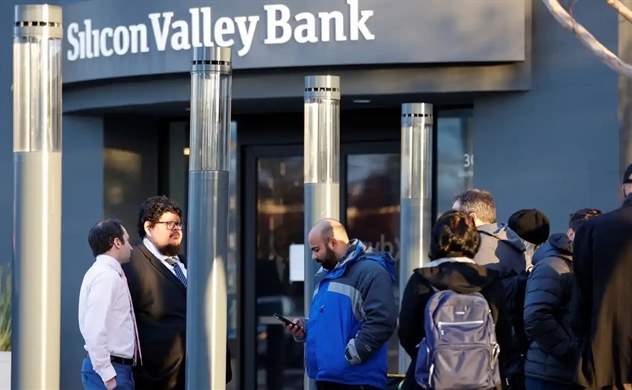Fears of global downturn grow over banking turmoil, higher rates

The collapse of Silicon Valley Bank has stoked concern of a wider banking crisis. Photo by Reuters.
Japan's real gross domestic product grew 1.6% on the year in the January-March quarter, outpacing market forecasts, preliminary data published Wednesday shows. But exports shrank 4.2%, partly due to sluggish growth in the U.S. and Europe.
Dow has faced "challenging macroeconomic conditions," CEO Jim Fitterling said in late April. The U.S. chemical maker said earlier this year that it will lay off 2,000, or around 5%, of its employees globally.
A Nikkei analysis of companies worldwide shows a 9% decrease in net profit on the year for January-March, excluding those in finance and materials. This represents the fourth straight quarter of decline.
Yet positive signs are on the horizon, like the improvements in global supply chains. Supply chain disruptions have been a major contributor to inflation in recent years.
The New York Federal Reserve's Global Supply Chain Pressure Index is now at minus 1.32 -- its lowest point since 2008 -- after surging during the height of the coronavirus pandemic.
Ford Motor booked a roughly $1.7 billion profit in the January-March quarter as the components shortage eases. The automaker can expect "tailwinds driven by improvement in the supply chain" for the full year, Chief Financial Officer John Lawler said.
With inflationary pressure fading, key central banks appear to be scaling back efforts to tighten monetary policy.
Though the European Central Bank is expected to continue raising interest rates, some senior figures at the U.S. Federal Reserve are signaling a potential end to hikes. Speculation suggests that the U.S. and Europe are in the final stages of tightening.
But tighter monetary conditions still pose a risk to economies worldwide. In the U.S., where three regional banks have collapsed this year, the Federal Reserve's latest quarterly loan officer survey showed stricter lending standards. Corporate demand for funds was at the lowest level since 2009.
Debts that ballooned during the easy-money policies of the COVID-19 pandemic are now exposed to higher interest rates, and not just in the U.S. Swedish real estate company SBB's credit rating was cut, and its share price is down roughly 40% since May 8, when the group postponed its dividend.
Rising interest rates in advanced economies might cause investors to pull money back worldwide, sinking currencies like Argentina's peso and the Turkish lira and spreading the pain.
Meanwhile, China's economy is recovering from COVID-19 but still carries weakness in its highly indebted real estate sector. Nonperforming real estate loans reached a 10-year high in December at the four largest Chinese banks, up roughly 60% from a year earlier.
In the U.S., "a recession beginning in late 2023 still seems likely," driven by slowing consumer and business activity, said Kurt Rankin at PNC Financial Services Group.
As for Europe, Commerzbank Research's Christoph Weil wrote in a recent note: "The slight increase in the first quarter should not distract from the fact that the signs in the euro area continue to point to recession."
According to 10 economists, the U.S. has a 53% chance of falling into an economic downturn in the October-December quarter. The eurozone has a 42% chance, while Japan has a 30% probability of entering a downturn early next year.
Source: Nikkei Asia
Same category news
-
Tsubasa Suruga
-
Kenya Akama - Fumika Sato

 TIẾNG VIỆT
TIẾNG VIỆT 


















